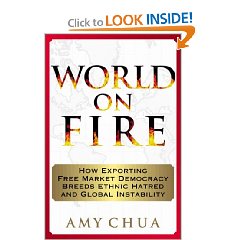What I found most intersting, having spent much of my life in Asia and Latin America, and been close to some Chinese elements in Singapore, was that much of the author's case is based on Chinese examples, not American. This makes the book especially valuable to Americans, because when she speaks of a world on fire and the dangers of ethnic conflict coming out from under market-dominant minorities, she is speaking about Chinese examples, not American examples. As the Godfather would say, “This is not personal, this is business.”
The author ends with a number of recommendations that appear sensible, but that at this point have no hope of every being considered by the US or other Western powers–or in China. The author's recommendations require an educated public exercising its political power in the pursuit of both global stabilization and national prosperity as seen through a long-term lens. It may take another 9-11, the meltdown of Arabia, and several more genocides in Malaysia and Indonesia, the utter chaos in the Congo, the Ivory Coast, Sudan, and Burundi, to name just four failed states that are testing the United Nations, before the public ultimately realizes that what is exported overseas “in their name” ultimately comes home on fire. The book is well-titled, the author's thesis is important, and those who do not like this book are well-qualified to represent the problematic organizations that the author is discussing.





